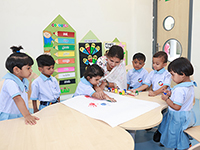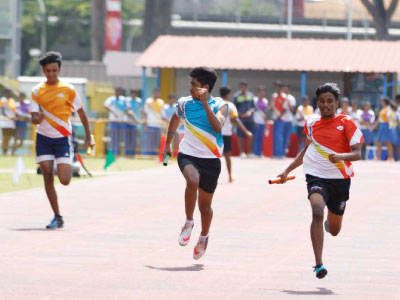The Internet serves as a vast repository of information. Students can access information, communicate, and learn new concepts anytime and anywhere. That’s not it—today, top CBSE schools in Nagpur like GIIS use online videos and digital tools to add value to classroom lessons, helping students understand complex concepts better.
The internet has surely transformed how students learn and made information accessible, but is it a safe space? In a world where students spend hours together on online platforms, it is only vital that they understand the complexities and challenges of the digital realm.
Here is a complete guide to understanding digital etiquette and online safety for students.
1. Understanding Digital Etiquette
What is Digital Etiquette, and Why is it Important?
Digital etiquette, otherwise known as netiquette, refers to a set of guidelines for appropriate behaviour online. Whether you are sending an email, using social media, playing video games or understanding concepts on learning platforms, everyone should have a positive experience.
It’s all about being kind and compassionate towards others while fostering respectful and effective online interactions.
But why has digital etiquette become so important, you ask?
With the internet becoming a crucial part of students’ daily lives, it is only obvious we create a safe and positive space. By practising digital etiquette, one avoids misunderstandings, encourages clear miscommunication, promotes respect, protects privacy, and discourages cyberbullying and online arguments.
Ways to practice digital etiquette
How do we prevent cyberbullying and internet safety for students? Be mindful and practice digital etiquette. Here are a few ways you can do that.
- Think before you type:In a fast-paced world, it is important to slow down occasionally and think things through. Words can ruin someone’s image and mental health, so before posting something or sending a message, imagine how it will affect the person on the receiving end. If you can’t say something nice, it is best not to say anything.
- Be kind and respectful:Treat others as you would like to be treated. Use kind words such as “please” and “thank you”. Show respect when communicating with others.
- Respect privacy:Not everything should be on social media. When sharing any kind of information, especially of a loved one, don’t share it without their permission.
- Avoid shouting:Don’t write messages in all caps, as it is considered impolite and interpreted as shouting.
- Be mindful of tone:Online communication can be easily misinterpreted without facial expressions and tone. Hence, it is best to avoid sarcasm and offensive topics, as they could be easily misunderstood by people.
- Avoid using slang or curse words:Communicate clearly without any slang or curse words, as they can be hurtful to others and affect mental well-being or cause conflict.
Positive Impact of Good Online Behaviour on Future Opportunities (academic and career)
The thing with the internet is that everything stays put. You can find things said or done years back on online platforms. While bad behaviour isn’t beneficial to anyone, good online behaviour isn’t only about online safety for students but is much appreciated and can enhance your future opportunities.
- Shows character and communication skills:The way you interact with others on online platforms and practising digital etiquette can have a positive effect on your future. It goes to show the kind of person you are: that is well-mannered and has great communication skills.
- Helps create a good online reputation:Your good behaviour can take you to heights. Online platforms help build a good reputation, showcasing your strengths and the kind person you are.
- Avoids online conflicts:Being good online can keep you away from conflicts and bad repercussions. This way, you get to be at peace and reap the benefits of online platforms.
- Positive self-esteem:Being kind and compassionate to others will connect with more people. They will want to socialise with you and give you opportunities to learn and have a fun experience, boosting your self-esteem.
2. Online Safety Best Practices
Why is it important to protect personal information online?
Online platforms are a great way to get information and learn new things. However, they also act as breeding grounds for crime. It is best to keep the internet only for studying and entertainment and not to share personal information online, as it can lead to cyber-attacks, identity theft and privacy breaches.
Safe social media habits to have
If you are wondering how to prevent cyberbullying, these safe social media habits are the best way to do so.
- Privacy Settings: Students of every age are on social media, consuming and sharing different types of content. While being entertained and having a little fun is not frowned upon, it is only important that you ensure your privacy settings are fine-tuned and have control over who can view your profile.
- Limit Sharing:While sharing photos, memories or thoughts, ensure you turn off your location and your background doesn’t give away personal details. Also, ensure you update stories/status or post vacation photos only after you have reached home.
- Be Selective: Not everyone is your friend, especially people you don’t know. Avoid accepting a friend request from strangers.
- Two-factor Authentication:Almost all social media apps offer two-factor authentication, providing you with an extra layer of safety, use that.
- Strengthen Passwords:Use unique passwords for each account and ensure to change your passwords frequently to avoid being a victim of online scams. Use a combination of letters, numbers and special characters to create a strong password.
Read More: Inclusive Education: Creating a Welcoming and Inclusive Environment for All Students
What are the dangers of cyber threats?
Students are particularly vulnerable to cyber threats given their age, inexperience, lack of knowledge and increased reliance on technology for education. Cyber threats such as phishing, data theft and bullying are of significant dangers. One needs to be extra careful and practice internet safety for students when using online platforms.
3.Cyberbullying Awareness and Prevention
Definition and forms of cyberbullying
Cyberbullying is bullying via digital devices like cell phones, computers and tablets. It happens through text messages, social media, online forums or video games. Cyberbullying includes sharing inappropriate images/videos, negative content or personal information that can be humiliating.
Some examples of cyberbullying are forgery and impersonation, information theft and cyberbaiting.
Here are steps to handle cyberbullying
Unfortunately, many students fall victim to cyberbullying. So, the question is how to prevent cyberbullying. While it is not a pleasant situation to deal with, there are a few steps to handle the situation.
- It is best not to engage, as the goal is to anger the victim and get a reaction from them. Reporting and ignoring the bully is a great way to minimise the attack.
- Block the bully from your social media or whichever online platform they are bullying you on.
- Cyberbullying is not acceptable and should not be kept under cover. Students should seek help, reporting the situation to their elders.
- Revisit your privacy settings. Give access to your online platforms only to people you know and trust. This goes without saying: don’t accept friend requests from just anyone.
4. Teaching Digital Responsibility at Schools and Homes
GIIS, Nagpur, offers a smart learning environment that enhances the experience for students. Our digital classrooms don’t replace the traditional learning method but instead complement the curriculum. Every classroom has two 65” Wi-Fi-enabled smart TVs, audiovisual tools, projectors and smart boards, making students digitally literate. As one of the leading international schools Nagpur, we are committed to providing a globally-minded and technologically advanced learning experience.
While that is that, digital literacy and internet safety for students don’t stop at school, parents too should talk to children about being safe, polite and kind to everyone over the internet. This way, risks or challenges are avoided, and digital well-being is maintained, making it a good and safe space for everyone.
With students using digital devices and platforms more than ever today, digital etiquette and how to prevent cyberbullying are crucial. Now that you know the what, why and how, please stay safe. For an immersive learning environment with state-of-the-art technology and various other top-notch facilities, apply to Global Indian International School, Nagpur. Inquire about CBSE scholarship opportunities for Ay’ 2025-26 that may be available.

 Nagpur Campus
Nagpur Campus

















